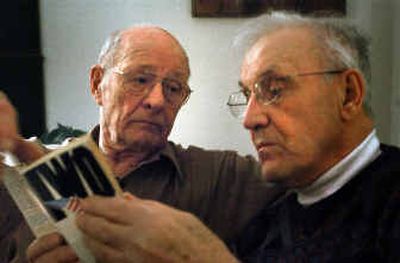Vets recall sands of Iwo Jima

They faced countless attacks from enemy fire as friends around them died.
Sixty years ago today, Marines Mike Ladich and Don Newbold landed on the barren island of Iwo Jima, the first day of one of the deadliest World War II battles in the Pacific.
“If there was a Dante alive today, he’d pick that place as his hell,” Ladich said.
The two Marines, who live in Spokane, and thousands of others spent almost 40 days on the island wrestling it from the Japanese so it could be used as a base for bombing Japan.
About 6,800 Americans and 21,000 Japanese died in the battle. Another 19,000 Americans were wounded.
Ladich said the landing was far from a surprise to the Japanese. As he was at sea preparing to land, he heard Tokyo Rose in a propaganda radio broadcast warn Americans about the upcoming battle.
He landed in an amphibious tank that was struck by artillery fire almost as soon as it reached the beach. As he describes it, the Marine landing was an event reminiscent of the opening scene in “Saving Private Ryan,” which portrays the Allied invasion of Normandy on June 6, 1944.
“We weren’t there a minute,” Ladich said. “I looked back and I heard a lot of screaming. What they tell you on the beach is, don’t stop.”
Newbold landed a couple of hours after Ladich. The beach was still unsafe.
“The first thing I saw was a guy cart-wheeling 15 feet in the air,” Newbold said.
From the beach, they climbed terraces covered with volcanic ash – with some 80 pounds or more of gear – all while taking fire and while their fellow Marines were dropping around them.
“We were stumbling all over the place,” Ladich said. “We were catching fire from the rear and from the front.”
Despite the slow but steady progress of the Marines, few of their enemies quit. They faced sniper attacks until the final day.
“I did not see a guy surrender,” Ladich said. “The next thing you know, you hear a shot and somebody drops.”
Ladich, a retired teacher, and Newbold, a retired insurance agent, each moved from different Western Washington communities about a year ago. And, coincidentally, they settled just down the street from each other in south Spokane.
They don’t care to repeat their war experience, but said they would if their country called.
“If I learned anything, it was loyalty to not only my comrades in battle, but to … my family, my country, my community,” Ladich said.